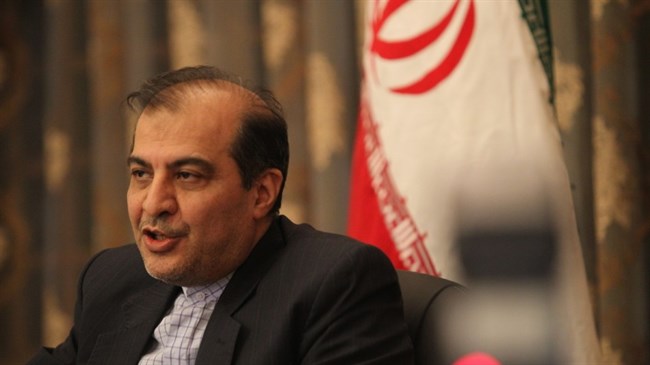
Iran’s envoy to China urges Beijing to help safeguard nuclear deal

In in an interview with the South China Morning Post last published on Monday, Iran’s Ambassador to China Ali Asghar Khaji said Beijing had a positive role to play in upholding the deal, and should boost economic cooperation with Tehran.
He also said the Iranian foreign minister chose Beijing as his first stop on a whirlwind diplomatic tour last week because of China’s "importance” to Iran.
"We expect other remaining members of the Joint Comprehensive Plan of Action (JCPOA), including China, to help implement and continue this deal, and fulfill their commitment and obligations according to this deal,” Khaji said, referring to the plan reached in 2015 that will see Iran significantly reduce its uranium stockpile by 2030 in exchange for the lifting of economic sanctions.
"If we could gain these rights and benefits from this deal we will stay in it. If these Iranian rights were not satisfied, and our interests were not reached, we will think about other options,” he said, without specifying what the other options were.
The nuclear deal reached between Iran, Germany and the five permanent members of the United Nations Security Council – China, Russia, the United Kingdom, France, and the United States – was once seen as a consequential accord that would reshape Middle East politics.
But US President Donald Trump called the agreement "a horrible, one-sided deal” and announced the US would withdraw, leaving Iran vulnerable to a new wave of sanctions, while companies with business ties to Tehran may face US penalties.
Last week, Iranian Foreign Minister Mohammad Javad Zarif met his counterparts from China and Russia, as well as Britain, France, Germany and the European Union, in a bid to rescue the deal. Despite Washington’s withdrawal, all the other signatory nations have vowed to keep the pact alive.
"So with this positive atmosphere, we believe that, and we hope that, we can continue the JCPOA without the United States,” Khaji said.
Khaji said Zarif "intentionally” made Beijing his first destination on the trip, before Moscow and Brussels, because China is Iran’s top trading partner, the top oil and non-oil buyer, as well as a major investor. "This decision was made because of the importance of China for us,” he said. "We expect China, as a member of the P5+1, to continue to play its positive role to implement and safeguard the nuclear deal.”
US ‘illegal’ withdrawal
Khaji criticized the US pullout as "totally illegal” and signaled to the international community that Washington was not trustworthy. "Not only Iranians, but other nations and countries lose trust in the United States because of this withdrawal,” he said.
During Zarif’s three-hour meeting with his counterpart Wang Yi in Beijing last Sunday, the Chinese side reaffirmed China’s commitment to safeguard the agreement and also agreed to expand economic cooperation between the two sides.
"Our Chinese friends again reaffirmed their stance against unilateral sanctions and actually pictured the framework of the future cooperation between the two countries on how to expand relations,” Khaji said.
On Thursday, Iran’s Oil Minister Bijan Namdar Zanganeh said state-owned China National Petroleum Corporation was ready to replace Total on a major gas field project in Iran if the French energy giant pulled out.
China has been Iran’s biggest trading partner and export market for the past 10 years. In 2017, their two-way trade jumped 21 percent from a year earlier to reach US$37.3 billion, while more than 200,000 trips were made between the two countries.
Iran is also an important part of China’s "Belt and Road Initiative” – aiming to boost trade and infrastructure links from Asia to Africa and Europe – because of its strategic location between East and West, just as it was a center of the ancient Silk Road. Iran signed a memorandum of understanding to join the initiative in 2016, when Chinese President Xi Jinping visited Tehran.
The bilateral relation between the two countries has also improved in other areas such as security, Khaji said.
Iran is an observer at the China-led Shanghai Cooperation Organization security bloc, and Xi has invited Iranian President Hassan Rouhani to this year’s SCO summit in Qingdao next month.
"We are positively looking at this invitation,” the ambassador said.
Source:Irandailynews















